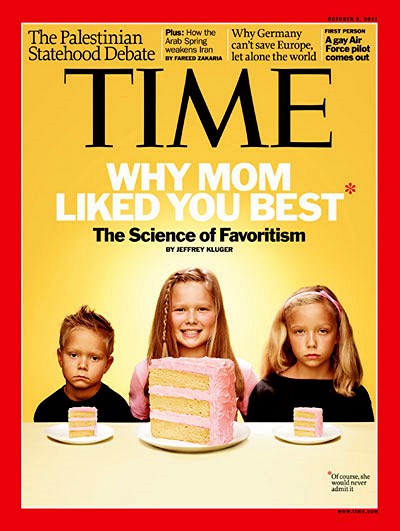 Sibling rivalry is rife in estate litigation
Sibling rivalry is rife in estate litigation
and often comes to the fore with
the death of the parents—
particularly the last parent.
Although some fortunate siblings
may be the best of friends, that
situation is obviously rare in our
practices.
One of our favourite sibling stories
happened in the case of “Robert.” He
was the youngest child, born many
years after his four older siblings.
Robert and his mother “had been
very close” and when she died, he
ended up with her entire estate. The
That story serves as an allegory
for sibling rivalry. Seemingly minor
childhood conflicts can result in
underlying resentments that may last
a lifetime. Such resentments often
emerge during the emotional upheaval
following the death of parents.
Sibling rivalry exists among most
animal species where competition
begins at birth. The rivalry may be
extreme—take for example, the black
eagle who lays two eggs. Mother looks
on while the first hatchling pecks the
second to death.
Among humans, sibling rivalry dates
back to the Bible. The Book of Genesis
tells of the jealousy between Adam and
Eve’s sons Cain and Abel. When Cain
kills Abel, the first murder occurs. That
story has inspired much Western art and
literature over the centuries.
Sibling rivalry remains a common
theme in our culture and is found in
television shows from Leave It to Beaver
to Family Guy, from Friends to The
Smothers Brothers with Tommy’s
frequent refrain, “Mom always loved
you best.” Social media loves to report
on the “friendly” tennis competition
of Venus and Serena Williams.
Our clients often include those
who adopted traits that their parents
approved of, those who rebelled, and
those who simply withdrew from the
competition altogether. It seems many
of us grew up with internal labels
such as “I’m the smart one,” “I’m the
athletic one,” or “I’m the black sheep.”
disinherited siblings sued. At the
examinations for discovery, the siblings
were extremely hostile, glaring at
Robert. During questioning, Trevor
asked Robert’s older sister about her
obvious hatred toward her youngest
brother. He fully expected to hear
how Robert was selfish, greedy,
and dishonest. Instead, the sister
responded, “He was allowed to have
cheese sandwiches before bed and
we weren’t!” The others nodded in
agreement.
Sibling Rivalry:
Mom Always
Loved You Best
Seemingly minor childhood
conflicts can result
in underlying resentments
that may last a lifetime.
Wills & Estates
Trevor Todd
Judith Milliken, QC
©iStockphoto.com/Fertnig Photography
72 The Society of Notaries Public of British Columbia V olume 22 N umber 3 Fall 2013
Unfortunately, it seems some
parents more or less openly favour
a preferred child. Others needlessly
criticize a less-favoured child. Such
treatment inevitably creates resentment
between and among the siblings.
Psychologists report that from age
18 months, siblings can understand
family rules and know how to comfort
and be kind to each other. By age 3,
children have a sophisticated
grasp of the social rules within the
household and know how to adapt
to circumstances within the family.
One school of thought suggests
that fighting among siblings may
actually increase in adolescence, with
early teens reaching the highest level
of competition.
Some say that sibling bullying and
abuse are largely underreported. Recent
studies have indicated that bullying
and aggressive behaviour by a sibling
can be just as damaging as bullying
by a classmate, neighbour, or peer.
Most disturbing in our practice are
the surprising number of female clients
who have apparently suffered sexual
abuse by a teenage brother, usually
a few years older. They include serious
sexual assaults leaving lasting scars.
The Role Played by Parents
While it is natural for siblings
to compete, parents can certainly have
a positive or a detrimental effect in
reducing the potential to cause great
damage. Starting early to reduce such
rivalry is key. It is beyond the scope
of this article to provide parenting
advice but there are many useful
self-help books available, for example
Siblings Without Rivalry by Adele Faber
and Elaine Mazlich.
By the time most clients reach
a lawyer’s office, the horse is out of the
barn. It often seems parents have
contributed to rivalry by encouraging
competition, snitching, teasing, or
displaying overt favouritism. We
also unfortunately see the results
of highly dysfunctional families where
a parent with a personality disorder
has deliberately played one sibling off
against the others for most of their lives.
Sibling rivalry is inherent in human
nature. Most of us grew up competing
for an equal share of limited family
For example, if one child has
a disability, it is important that the
memorandum accompanying the Will
explain that fact clearly. Such an
explanation will often be better received
if also delivered to the family in person,
while the parent is still alive.
Clarity is also extremely important.
Even matters such as funeral
arrangements can cause great conflict
between and among siblings after
death when emotions of grief can
easily turn to anger. Long-standing
resentments by siblings can manifest
in pettiness—basically the need
to control . . . to flex their muscles and
withhold control from others.
Minimizing the opportunity for
conflict is important. Clear, written
directions by the parent are often
persuasive, for example, directions
for any funeral or celebration of life,
clear directions as to who specifically
should receive which items of personal
property. In these days of ubiquitous
technology, for further clarification it
is easy to take photographs and attach
them to any list.
Thoughtful legal practitioners will
have many more practical suggestions
for addressing this age-old problem. s
Trevor Todd restricts his practice
to estate litigation and has practised
law for 38 years. He is a past President
of the Trial Lawyers Association of BC,
a past chair of the Wills and Trusts
(Vancouver) Subsection, and a past
president of the New Westminster Bar
association. He frequently lectures
to CLE, TLAB C, the BC Notaries, and
various law, business, or general
public sessions on estate law issues.
disinherited.com is 17 years old.
It has hundreds of blogs and articles
and currently over 5600 visitors per
month on average.
Judith Milliken, QC, hails from
Saskatchewan. She has practised law
in BC since 1976. A former commercial
lawyer then senior Crown Counsel, she
is a highly experienced litigator who
practises exclusively estate litigation,
Wills, and trusts with Stewart Aulinger,
Vancouver.
judithmilliken@telus.net
resources, whether that be parental
attention, time in the bathroom, or
a share of dessert.
Other complicating factors
include the so-called “blended family”
involving step-siblings Many cultures
also significantly favour males, which
can lead to “societal sibling rivalries”
between men and women.
Significant life issues such as
care giving for elderly parents or
unequal treatment in inheritances can
inflame old grievances and perceived
slights. Even making funeral
arrangements can bring out the worst
in the surviving children.
While siblings display an intense
need to share equally in their
inheritances, unfortunately some
parents continue to play favourites
until the end, leaving some children
much larger or lesser shares of the
estate. That usually causes incredible
bitterness and resentment. On a basic
level, survivors equate inheritance
with parental love and cannot bear
being loved less by a parent than their
siblings were loved.
Lesser shares also invite litigation
under British Columbia’s Wills Variation
Act for it defies the moral claims
of the children to share equally in their
parents’ estates.
The societal expectation that
children will receive equal shares was
recognized by Madame J. Daphne
Smith, now of the Court of Appeal, in
Ryan vs. Delahaye 2003 BCSC 1081.
In paragraph [67] she said, “In the
absence of express reasons for an
unequal distribution, contemporary
standards create a reasonable
expectation of children sharing equally
in a parent’s estate.”
Reducing Sibling Rivalry after Death
Parents are strongly encouraged
to divide their estates in equal shares
among their children. If there is
a compelling reason to do otherwise,
it is crucial for parents to address
their communications thoughtfully.
Parents are strongly
encouraged to divide their
estates in equal shares
among their children.
Volume 22 N umber 3 Fall 2013 The Scrivener 73



